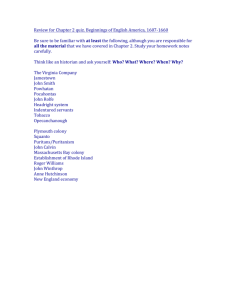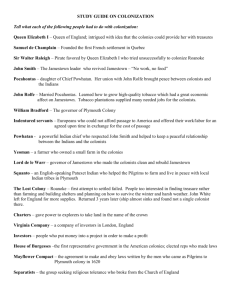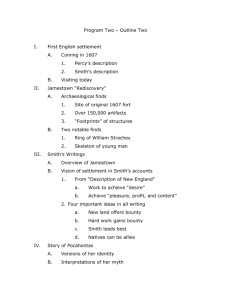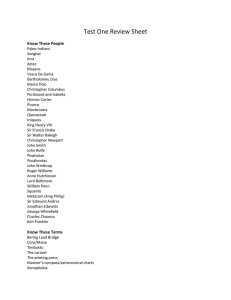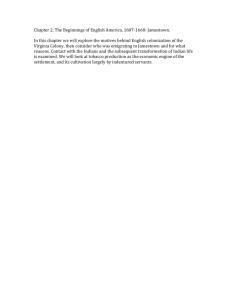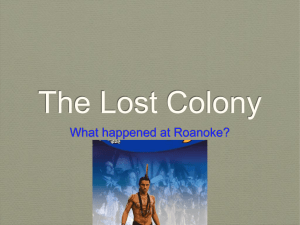Chapter 2 Vocabulary
advertisement
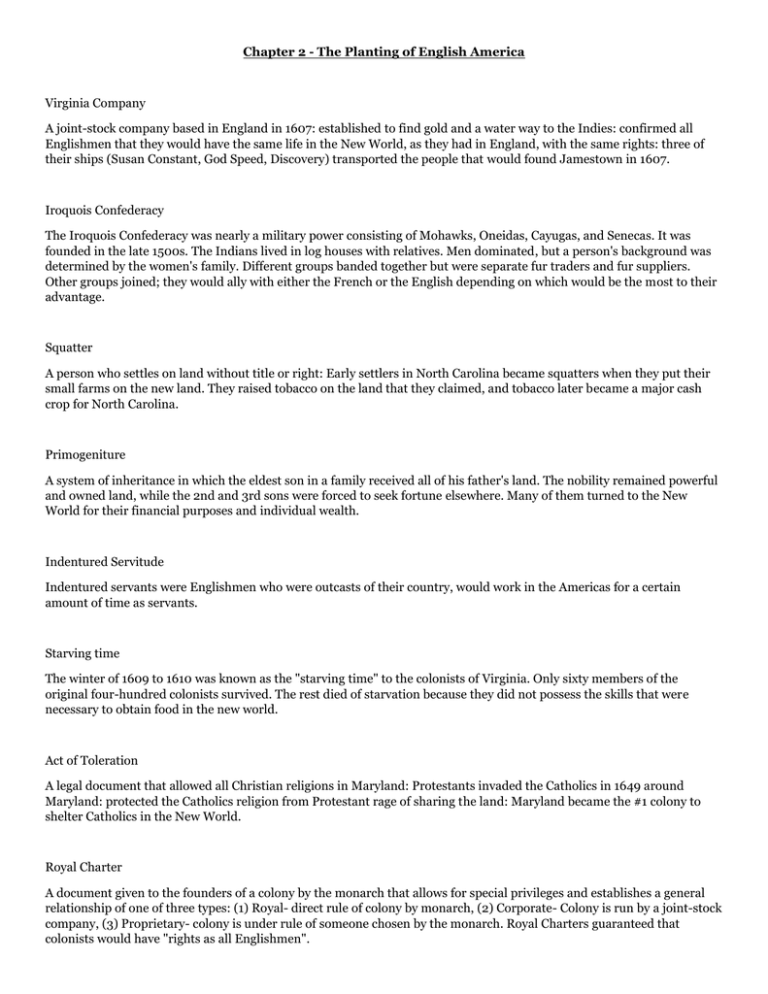
Chapter 2 - The Planting of English America Virginia Company A joint-stock company based in England in 1607: established to find gold and a water way to the Indies: confirmed all Englishmen that they would have the same life in the New World, as they had in England, with the same rights: three of their ships (Susan Constant, God Speed, Discovery) transported the people that would found Jamestown in 1607. Iroquois Confederacy The Iroquois Confederacy was nearly a military power consisting of Mohawks, Oneidas, Cayugas, and Senecas. It was founded in the late 1500s. The Indians lived in log houses with relatives. Men dominated, but a person's background was determined by the women's family. Different groups banded together but were separate fur traders and fur suppliers. Other groups joined; they would ally with either the French or the English depending on which would be the most to their advantage. Squatter A person who settles on land without title or right: Early settlers in North Carolina became squatters when they put their small farms on the new land. They raised tobacco on the land that they claimed, and tobacco later became a major cash crop for North Carolina. Primogeniture A system of inheritance in which the eldest son in a family received all of his father's land. The nobility remained powerful and owned land, while the 2nd and 3rd sons were forced to seek fortune elsewhere. Many of them turned to the New World for their financial purposes and individual wealth. Indentured Servitude Indentured servants were Englishmen who were outcasts of their country, would work in the Americas for a certain amount of time as servants. Starving time The winter of 1609 to 1610 was known as the "starving time" to the colonists of Virginia. Only sixty members of the original four-hundred colonists survived. The rest died of starvation because they did not possess the skills that were necessary to obtain food in the new world. Act of Toleration A legal document that allowed all Christian religions in Maryland: Protestants invaded the Catholics in 1649 around Maryland: protected the Catholics religion from Protestant rage of sharing the land: Maryland became the #1 colony to shelter Catholics in the New World. Royal Charter A document given to the founders of a colony by the monarch that allows for special privileges and establishes a general relationship of one of three types: (1) Royal- direct rule of colony by monarch, (2) Corporate- Colony is run by a joint-stock company, (3) Proprietary- colony is under rule of someone chosen by the monarch. Royal Charters guaranteed that colonists would have "rights as all Englishmen". Slave Codes In 1661 a set of "codes" was made. It denied slaves basic fundamental rights, and gave their owners permission to treat them as they saw fit. Yeoman An owner and cultivator of a small farm. Proprietor A person who was granted charters of ownership by the king: proprietary colonies were Maryland, Pennsylvania and Delaware: proprietors founded colonies from 1634 until 1681:a famous proprietor is William Penn. Longhouse The chief dwelling place of the Iroquois Indians; c. 1500s-1600s; longhouses served as a meeting place as well as the homes for many of the Native Americans. They also provided unity between tribes of Iroquois Confederacy. Slavery the process of buying people (generally Africans) who come under the complete authority of their owners for life, and intended to be worked heavily; became prominent in Colonial times around the mid to late 1600's ( but also to a lesser degree, concerning natives during the early 1500's) because of the labor intensive nature of the crops being grown, and the desire for a profit; mainly used on southern plantations, but also a little bit in the north; brought Africans to America, who have now become an integral part of our culture. Enclosure caused by the desire of land-owning lords to raise sheep instead of crops, lowering the needed workforce and unemploying thousands of poor former-farmers; the lords fenced off the their great quantities of land from the mid to late 1500's forcing many farmers out and into the cities, leading many of them to hire themselves as indentured servants for payment of passage into the New World, and therefore supporting many of the needs of the labor-thirsty plantation owners of the New World. House of Burgesses The House of Burgesses was the first representative assembly in the New World. The London Company authorized the settlers to summon an assembly, known as the House of Burgesses. A momentous precedent was thus feebly established, for this assemblage was the first of many miniature parliaments to sprout form the soil of America. James Oglethorpe Founder of Georgia in 1733; soldier, statesman, philanthropist. Started Georgia as a haven for people in debt because of his interest in prison reform. Almost single-handedly kept Georgia afloat. John Smith John Smith took over the leadership role of the English Jamestown settlement in 1608. Most people in the settlement at the time were only there for personal gain and did not want to help strengthen the settlement. Smith therefore told the people, "People who do not work do not eat." His leadership saved the Jamestown settlement from collapsing. Nation-state A unified country under a ruler which share common goals and pride in a nation. The rise of the nation-state began after England's defeat of the Spanish Armada. This event sparked nationalistic goals in exploration which were not thought possible with the commanding influence of the Spanish who may have crushed their chances of building new colonies. Powhatan Chief of the Powhatan Confederacy and father to Pocahontas. At the time of the English settlement of Jamestown in 1607, he was a friend to John Smith and John Rolfe. When Smith was captured by Indians, Powhatan left Smith's fate in the hands of his warriors. His daughter saved John Smith, and the Jamestown colony. Pocahontas and John Rolfe were wed, and there was a time of peace between the Indians and English until Powhatan's death. John Rolfe Rolfe was an Englishman who became a colonist in the early settlement of Virginia. He is best known as the man who married the Native American, Pocahontas and took her to his homeland of England. Rolfe was also the savior of the Virginia colony by perfecting the tobacco industry in North America. Rolfe died in 1622, during one of many Indian attacks on the colony. Lord Baltimore - 1694 He was the founder of Maryland, a colony which offered religious freedom, and a refuge for the persecuted Roman Catholics. Sir Walter Raleigh An English adventurer and writer, who was prominent at the court of Queen Elizabeth I, and became an explorer of the Americas. In 1585, Raleigh sponsored the first English colony in America on Roanoke Island in present-day North Carolina. It failed and is known as “The Lost Colony." Oliver Cromwell Englishman; led the army to overthrow King Charles I and was successful in 1646. Cromwell ruled England in an almost democratic style until his death. His uprising drew English attention away from Jamestown and the other American colonies. Pocahontas A native Indian of America, daughter of Chief Powahatan, who was one of the first to marry an Englishman, John Rolfe, and return to England with him; about 1595-1617; Pocahontas' brave actions in saving an Englishman paved the way for many positive English and Native relations.
